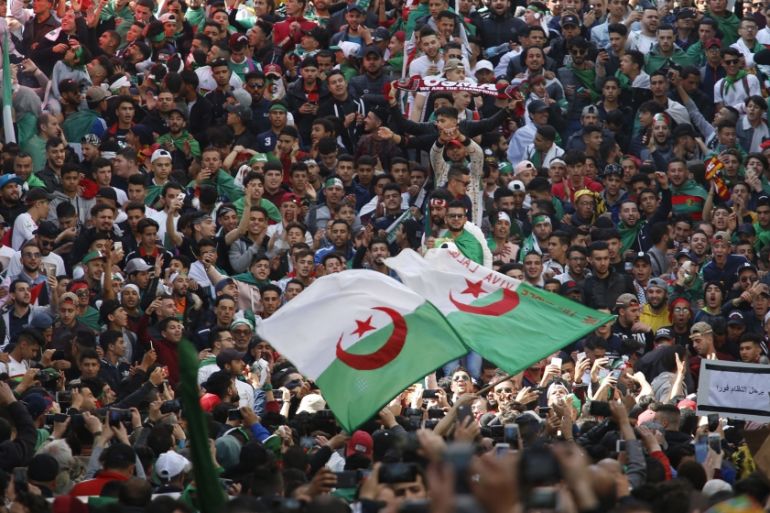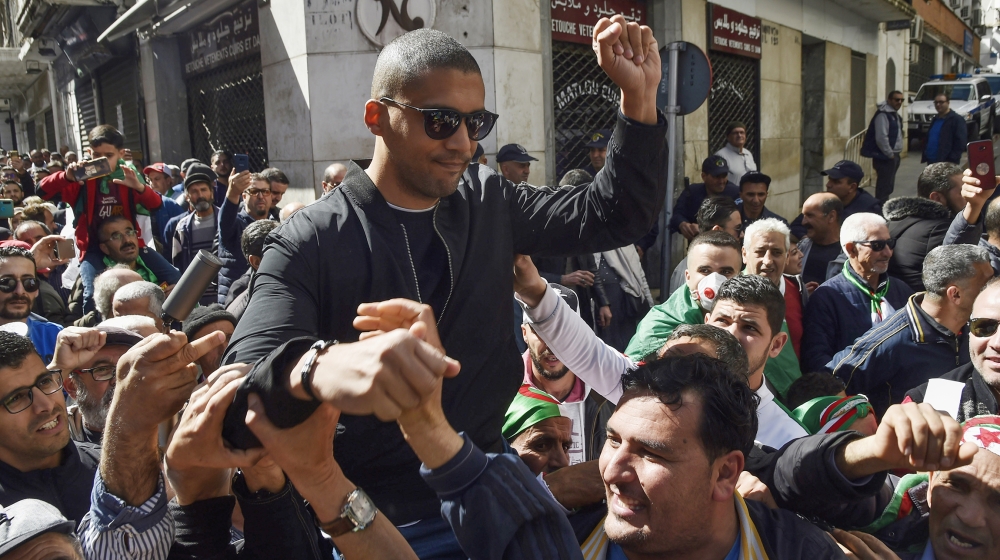Algeria rights groups say government cracking down on critics
Prisoner rights group says dozens, including students and activists, were summoned by police amid coronavirus measures.

Algiers, Algeria – When the well-known Algerian journalist Khaled Drareni was arrested by the police in late March there were no demonstrations on the streets of the North African country.
In an initial attempt to contain the coronavirus outbreak in Algeria, which has reported 2910 total cases and 402 deaths as of Thursday, the government on March 17 announced a series of measures, including a ban on marches and public gatherings.
Keep reading
list of 3 itemsCoronavirus: Which countries have confirmed cases?
Coronavirus tests Algeria’s protest movement
Drareni, who has widely reported on Algeria’s protest movement that erupted in February 2019, had previously been arrested on March 7 but he was provisionally released after an outcry and protests outside the courthouse.
Rights groups and media watchdogs condemned the rearrest of Drareni, a correspondent for the global media freedom group Reporters Without Borders (RSF) who has worked for several international media outlets.
“At a time when the COVID-19 pandemic highlights the importance of accurate reporting, Algerian authorities have instead opted to clamp down on the free flow of information,” said the Committee to Protect Journalists in a statement after the arrest. “Algerian authorities must release Khaled Drareni from this ludicrous prison sentence and drop all charges against him.”

The protest movement, also known as the Hirak, emerged after longtime ruler Abdelaziz Bouteflika announced he would run for a fifth term in office. While the mass demonstrations eventually helped force the president to step down in April 2019, the protesters continued to gather each week in an attempt to press for widespread reform of the country’s political system. The movement suspended its gatherings last month, citing the coronavirus outbreak.
The case of Drareni is one in a series of incidents in the country in recent weeks that activists say amount to a campaign against the critical voices and opposition in the country. Dozens of people including activists and students have been summoned since the novel coronavirus pandemic broke out, according to the National Committee for the Liberation of Detainees (CNLD), a prisoners’ rights group.
It has accused the authorities of cracking down on their opponents at a time when mass protests are not permitted.
“The authorities are taking advantage of this period of confinement because they know that people will not go out to protest on the street,” said CNLD coordinator Kaci Tansaout.
On Wednesday, Algeria’s Parliament passed a draft law criminalising “fake news” deemed harmful to “public order and state security”. RSF condemned the bill, describing it in a statement as “vaguely worded and draconian legislation” which is “designed to tighten the gag on press freedom”.
Sudden trial
In another high-profile case, the imprisoned opposition figure Karim Tabbou was suddenly brought to trial on March 24, two days before he was due to be released.
A former parliamentarian and prominent activist in the anti-government protest movement, Tabbou was sentenced to an additional six months in prison on charges of “affronting national unity” and “affronting the morale of the army”.
Nassima Rezazgui, a member of the Collective for the Defence of Prisoners of Opinion, which represents Tabbou legally, told Al Jazeera that the process violated constitutional laws and procedures.
“We were not notified that the trial was taking place. We went to the courthouse the day before to check if his case was programmed and found nothing. That means it was programmed in the morning and processed on the same day,” she said.
On the morning of his trial, Tabbou reportedly fainted when he learned that his lawyers would not be present and was taken to the infirmary. He was sentenced in absentia.
“The conditions of a trial were not fulfilled. Under law, the presence of the defendant during judgement is necessary. Karim was not even in the room,” Rezazgui said.

The next day the prosecutor general’s office issued a statement defending the trial.
“Karim Tabbou’s judgement was in conformity with article 347, paragraph 2 of the procedural criminal code, which considers the defendant present if he refuses to answer,” the statement said.
On the same day as the first coronavirus measures were announced, the ministry of justice suspended all hearings and appeals in criminal and correctional courts – a measure that has since been extended until the end of April.
The CNLD said at least 50 people have been summoned by the judicial police since March 17, including students and activists, some of whom were interrogated and provisionally released while others faced an immediate trial.
“There have been a lot of summons, arrest warrants issued and even arrests this week,” Tansaout said. “Most accusations are related to Facebook publications.” The CNLD said the most recent summons were ordered on April 15.
Rezazgui said that while the courts had suspended most of their activities, they continued to process cases against anti-government activists. On April 15, two young men in Bou Saada were placed on remand two days after being arrested because of Facebook posts. Their trial has been postponed until May 6.
“They are not judging anyone except those active in the Hirak. Those that use their constitutional rights of freedom of expression or peaceful demonstration find themselves in prison,” Rezazgui said.
No amnesty for political prisoners
On April 1, Tebboune announced a presidential amnesty which authorised the release of some 5,000 prisoners. The announcement made no mention of any link to the coronavirus outbreak in the country, but a number of countries have released prisoners in an attempt to protect them from potential outbreaks in prisons, where conditions are not conducive to physical distancing.
Opposition activists and politicians were among the groups of prisoners who were excluded from the amnesty, despite calls from lawyers, families and activists for their release.
Said Salhi, of the Algerian League of Human Rights (LADDH) said in a statement: “This really is an escalation of incomprehensible repression at a time when we need to empty prisons confronting the contagion of the coronavirus.”
Local media in early April reported two positive cases of the novel coronavirus in prisons, including one death.
